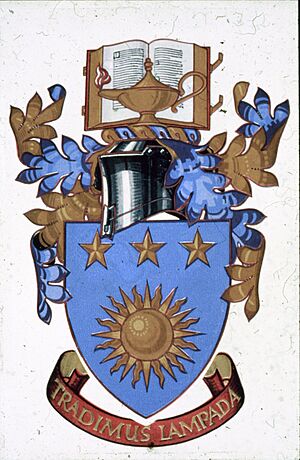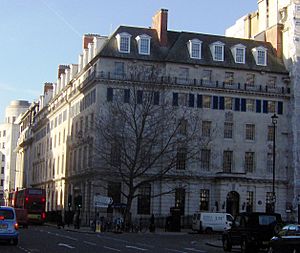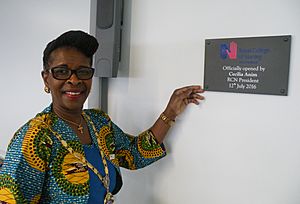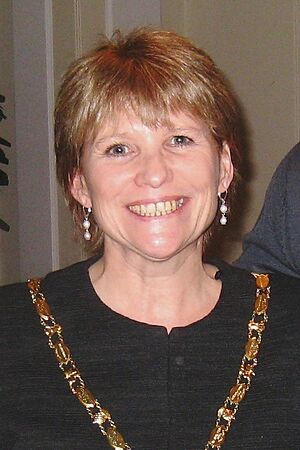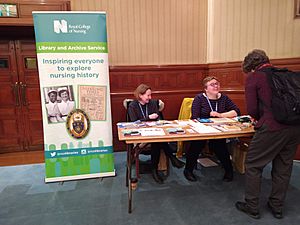Royal College of Nursing facts for kids
The Royal College of Nursing (RCN) is a special group in the United Kingdom. It helps people who work in nursing. The RCN is both a trade union and a professional body. This means it works to improve nurses' working lives and also helps them be the best nurses they can be.
The RCN started in 1916 as the College of Nursing. It received a special honour called a royal charter in 1928. This made it the "Royal College of Nursing." Queen Elizabeth II supported the RCN until she passed away in 2022. King Charles III became the RCN's patron in 2024. Most members are registered nurses. But student nurses and healthcare assistants can also join. Even retired nurses can be members at a lower cost.
The RCN aims to speak up for nurses and the nursing profession. It also works to make sure nurses provide excellent care. Another goal is to help shape health policies in the UK. The RCN has people called stewards and representatives who help members. It also offers advice services. The RCN has a main library in London and other regional libraries. The RCN Institute provides courses for nurses to learn more.
Contents
The RCN's Story
The College of Nursing Ltd began on March 27, 1916. It started with 34 members. It was created to be a professional group for trained nurses. Dame Sarah Swift and Sir Arthur Stanley helped start the College. They worked with other important nurses like Rachael Cox-Davies and Alicia Lloyd-Still.
Early Goals of the College
The College had five main goals when it started:
- To make nursing education and training better.
- To create a standard way of teaching nurses.
- To approve good nursing schools.
- To keep a list of people who were skilled nurses.
- To help pass laws in parliament that supported nurses.
Eleven matrons, who were head nurses, signed the founding papers. One of them was Margaret Elwyn Sparshott. By 1919, the College had grown to over 13,000 members. It had many nursing spots on the General Nursing Council when it was first set up. By 1925, it had about 24,000 members. At first, only registered general nurses could join. Male nurses and nurses from other special areas were not included. Annie Warren Gill helped start the RCN in Scotland in 1916. She also suggested in 1922 that married nurses should be members. This was important because more nurses were needed after World War 1.
Becoming the Royal College
The RCN received its royal charter in 1928. This made it the "Royal College of Nursing." Frances Goodall became an important leader. The College wanted registered nurses to be in charge. In 1935, Frances Goodall became the General Secretary. In 1939, the College officially changed its name to the Royal College of Nursing.
During the 1940s, the RCN worked to get equal pay for nurses. This was part of a bigger effort for women in public jobs. In 1955, the government agreed to make pay equal over time. Since 1977, the RCN has also been officially registered as a trade union. This means it can help nurses with their pay and working conditions.
The RCN in Recent Times
In 2019, the RCN held its first strike. This strike was in Northern Ireland. It was about nurses' pay and having enough staff. In April 2021, Pat Cullen became the leader of the RCN.
In 2022, the RCN held a vote for nurses to decide if they wanted to strike over pay. Nurses' pay had gone down by 20% between 2010 and 2022. The RCN asked for a pay rise that was higher than what the government offered. Many nurses in England voted to strike. Strikes happened in December 2022, and again in January and February 2023.
Where the RCN Works
The main RCN office in the UK is in London. It is at 20 Cavendish Square. This building is very old and important. It is also the main office for RCN England and the London area.
The RCN also has main offices in Scotland, Wales, and Northern Ireland. There are other RCN offices in England. These are in cities like Birmingham, Bolton, Leeds, and Nottingham.
How the RCN is Run
The RCN is led by its Council. The Council members represent all the RCN members. They make important decisions for the RCN. These decisions follow the RCN's royal charter and trade union laws.
Council Members and Leaders
As of 2024, the Council has 17 elected members.
- 14 members are chosen directly.
- 12 of these are elected by different areas of the UK (Scotland, Wales, Northern Ireland, and 9 English regions).
- One member is elected by student nurses.
- One member is elected by Nursing Support Worker members.
- These 14 members then choose three officers from among themselves. These are the Chair of Council, Vice Chair of Council, and Honorary Treasurer.
All RCN members vote for three other important roles:
- The RCN President.
- The RCN Deputy President.
- The Chair of RCN Congress (this person does not vote on the Council).
The RCN's General Secretary is chosen by the Council. Council members are not paid for their work. They volunteer their time to help the RCN and its members.
Chairs of Council (since 2005)
- 2005–2013 Sandra James
- 2013–2018 Michael Brown
- 2018–2019 Maria Nicholson
- 2019– Sue Warner
- Since 2024 Paul Vaughan
RCN Presidents
- 1922–1925 Dame Sidney Browne
- 1925–1927 Dame Sarah Swift
- 1927–1929 Annie Warren Gill
- 1929–1930 Rachael Cox-Davies
- 1930–1933 Margaret Elwyn Sparshott
- 1933–1934 Edith MacGregor Rome
- 1934–1935 Rachael Cox-Davies
- 1935–1937 Dorothy S. Coode
- 1937–1938 Edith MacGregor Rome
- 1938–1940 Beatrice Marsh Monk
- 1940–1942 Mary Jones
- 1942–1944 Emily E. P. MacManus
- 1944–1946 Mildred F. Hughes
- 1946–1948 Gladys V. L. Hillyers
- 1948–1950 Dame Louisa Wilkinson
- 1950–1952 Lucy Duff Grant
- 1952–1954 Lucy J. Ottley
- 1954–1956 Sybil C. Bovill
- 1956–1958 Gertrude M.Godden
- 1958–1960 Marjorie J. Marriott
- 1960–1962 Margaret J. Smith
- 1962–1963 Marjorie J. Marriott
- 1963–1964 Mabel Gordon Lawson
- 1964–1966 Florence Udell
- 1966–1968 Theodora Turner
- 1968–1972 Mary Blakeley
- 1972–1976 Dame Winifred Prentice
- 1976–1980 Eirlys M Rees
- 1981–1982 Marian K. Morgan
- 1982–1987 Dame Sheila Quinn
- 1988–1990 Maude Storey
- 1990–1994 Professor Dame June Clark
- 1994–1998 Professor Dame Betty Kershaw
- 1999–2000 Christine Watson
- 2000–2002 Roswyn Hakesley-Brown
- 2002–2006 Sylvia Denton
- 2006–2010 Maura Buchanan
- 2010–2014 Andrea Spyropoulos
- 2015–2019 Cecilia Anim
- 2019–2021 Dame Anne Marie Rafferty
- 2021–2022 Denise Chaffer
- Since 2023 Sheila Sobrany
RCN Chief Executive & General Secretary
- 1916–1935 Mary Snell Rundle
- 1935–1957 Frances Goodall
- 1957–1982 Dame Catherine M. Hall
- 1982–1989 Trevor Clay
- 1989–2001 Christine Hancock
- 2001–2007 Beverly Malone
- 2007–2015 Peter Carter
- 2015–2018 Janet Davies
- 2018–2021 Dame Donna Kinnair (interim August 2018 to April 2019)
- 2021–2024 Pat Cullen
- since 2024 Nicola Ranger
RCN Libraries and Archives
The RCN has four physical libraries. These are in London, Cardiff, Belfast, and Edinburgh. The biggest library is in London. It also handles the RCN's online library services. The London library started in 1921. It is said to have the largest collection of nursing books and resources in Europe.
The RCN Library is part of a group called The London Museums of Health & Medicine. It has special collections. These include old books about nursing history. It also has the RCN Steinberg Collection of Nursing Research. This collection has over 1,000 nursing research papers from the 1950s to the 2010s. The RCN Archive, which keeps historical records, is in Edinburgh. More and more of its services are available online.
Special Awards: Fellowships
The RCN gives out special awards called Fellowships. These awards recognize people who have made amazing contributions to nursing. Honorary Fellowships are given to people who cannot be RCN members. This might be because they are from other countries or work outside of nursing. Only a few people receive these awards each year. For example, in 2021, 11 Fellows and two Honorary Fellows were chosen. In 2022, five Fellows and three Honorary Fellows were chosen. People who receive these awards can use "FRCN" after their name.
RCN Publications
As of 2024, the RCN publishes an online magazine for its members. It is called RCN Magazine. It used to be called RCN Bulletin.
RCNi, which used to be RCN Publishing, creates Nursing Standard. This magazine is available by subscription and in stores. RCNi also publishes many journals for nurses who specialize in certain areas. These include:
- Cancer Nursing Practice
- Emergency Nurse
- Learning Disability Practice
- Mental Health Practice
- Nursing Children and Young People
- Nursing Management
- Nursing Older People
- Nurse Researcher
- Primary Health Care
See also
- List of nursing organisations in the United Kingdom - Wikipedia
 | Lonnie Johnson |
 | Granville Woods |
 | Lewis Howard Latimer |
 | James West |



